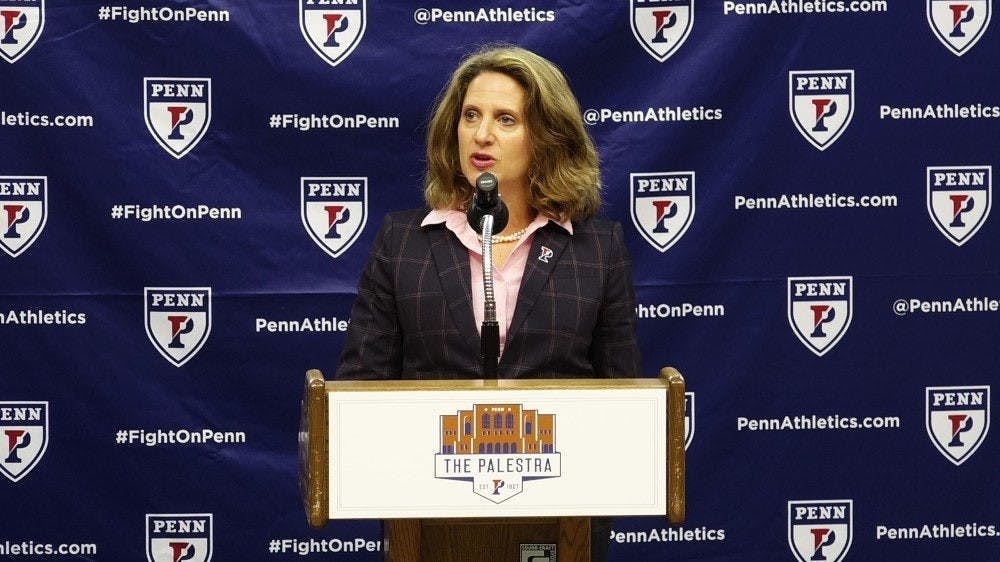
Several Penn student-athletes have voiced their support for the compensation of collegiate athletes as the NCAA is in the process of making a decision on the issue.
Credit: Sage LevineThe NCAA is making moves toward paying its collegiate stars after the executive board unanimously voted last Tuesday to allow athletes to profit from their names, images, and likenesses.
“The board realizes that it must embrace change to provide the best possible experience for college athletes," NCAA Board of Governors chair Michael V. Drake said in a statement.
Neither the Ivy League nor Penn Athletics provided official comment for this story before it was published. Penn Athletics did provide a statement on Nov. 5.
“The NCAA has taken an important step by committing to allow name, image, and likeness opportunities for student-athletes consistent with the college athlete model. Penn Athletics is committed to supporting the college athlete model of sports, where students compete against fellow students, not professionals or employees," Senior Associate Athletic Director of Governance and Administration Kevin Bonner wrote. "We look forward to continued dialogue with national leaders and the Ivy League in this ongoing conversation.”
Penn has a larger involvement in the NCAA decision-making process than most schools. Athletics Director M. Grace Calhoun is a non-voting, ex-officio member of the NCAA Board of Governors due to her role as chair of the NCAA Division I Council.
In some cases, it seems like Penn’s student-athletes agree with Drake.
“Honestly, I think it’s long overdue,” Penn football sophomore wide receiver Khalil Weathers said. “I think it’s very beneficial for the athletes and the programs. If there’s someone performing well, they deserve to get paid.”
Whether or not student-athletes should receive money while still amateurs is a heated, ongoing debate. Athletes like Weathers think that preserving an athlete’s amateur status isn’t as important as many people think because the time athletes put into practice is comparable to having an unpaid job.
“[Being an athlete] is definitely your job, and being committed to your sport isn’t an easy thing, especially at Penn," Weathers said. “I don’t think [losing amateur status] takes anything away.”
2019 first team All-Ivy and Defensive Player of the Year Eleah Parker is in the same boat.
“Some people [say], ‘Well they’re student-athletes, they shouldn’t be paid, they’re not professionals, let them be students,’ and I [say], 'Well, they do devote a good amount of time toward their sport.'
“With basketball, people are going to college for one year and then going to the NBA," Parker continued. "So people are passing up their education to go professional, when they could be getting their own education. I think it’ll encourage people to stay in school.”
As America waits for a progress report from the Board of Governors, which will be led by Ohio State Athletic Director Gene Smith and Big East Commissioner Val Ackerman, the debate continues to draw attention and the potential benefits and drawbacks of the decision to compensate student-athletes continue to come to light.
Penn volleyball junior middle hitter Caroline Leng highlights how the decision could change the way college athletics works with sponsors.
“I think it’s pretty huge because it completely changes the relationships that schools have with their athletes and with their sponsors. Right now, Nike sponsors all of Penn Athletics, but that might completely change starting in 2021 because brands will want to sponsor individual athletes instead of schools.
“For athletes, I think it’s an opportunity to earn money, and I think that’s huge because it’s going to completely change how athletes look at schools, but I think it’s also going to really change the dynamic between walk-ons and starters. It’s going to shift the attention toward individual players instead of the whole team.”
Leng also emphasized how the NCAA’s decision could increase opportunities for athletes pursuing professional careers.
“I know a lot of really good athletes won’t go to college for all four years because they have that chance to earn millions of dollars that they wouldn’t if they chose to stay in college," she said.
The NCAA is under pressure, facing newly-passed California legislation that allows college athletes to retain their scholarships and remain on their teams, even if they enter sponsorship deals. As other states consider similar legislation, Drake has expressed that the NCAA wants to avoid taking legal action against states that are working to overturn the amateurism rule.
As the NCAA pursues a solution, the nation waits for new information on a decision that could forever change what it means to be a college athlete.
This story was updated on Nov. 5 at 2:45 P.M. to reflect a statement from Penn Athletics.
The Daily Pennsylvanian is an independent, student-run newspaper. Please consider making a donation to support the coverage that shapes the University. Your generosity ensures a future of strong journalism at Penn.
Donate



